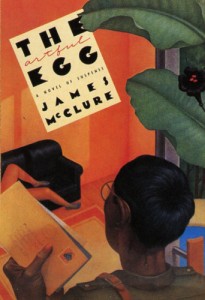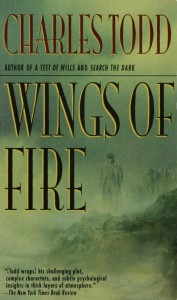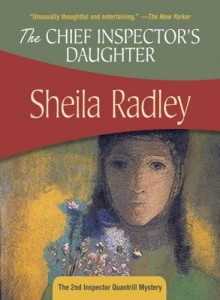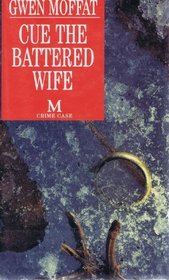Biblios = Books about Books
- Part 1: Books about Books–Better Known as Biblios
- Part 2 Biblios Focusing on Booksellers/Collectors
- Part 3 Bibilos Focusing on Writers
- Part 4 Biblios Focusing on Writers
- Part 5 Biblios Focusing on Publishing
 I’m amazed at how many mystery books are about writing, authors, publishing, letters, rare manuscripts, diaries, collecting, rare exotic volumes, writers as detectives, booksellers as detectives, fictional characters as detectives. and just plain books. So, the saga continues with some more interesting titles with a biblio theme. I’m concentrating on the author, in this installment.
I’m amazed at how many mystery books are about writing, authors, publishing, letters, rare manuscripts, diaries, collecting, rare exotic volumes, writers as detectives, booksellers as detectives, fictional characters as detectives. and just plain books. So, the saga continues with some more interesting titles with a biblio theme. I’m concentrating on the author, in this installment.
A Day for Dying, Dorothy Simpson, 1995 is in the lighter part of the genre. At a formal engagement party, only the British can give, the about to be groom is popped into the pool, left to drown. All manner of convoluted plot points abound; love letters, lost notes, ruined reputations, blackmailers, and the revelation that victim, who was an author, was also a slime-ball are but a few. I enjoyed Ms. Simpson’s books when younger, but haven’t reassessed them lately. I enjoyed the personality of her detective Luke Thanet.

At the opposite end of the mystery spectrum, Ruth Rendell writing as Barbara Vine, explores the life of a famous author postmortem, with all the dark underpinnings so well presented by the prolific and superb writer. The Chimney Sweeper’s Boy , 1998 was not a favorite of mine, and I’ve read everything, I’m not exaggerating, of Rendell. But saying that a particular Rendell isn’t a favorite means it was only slightly less perfect because she cannot write a bad book–it isn’t in her DNA.
Here’s an interesting victim, a poet. I’ve often wanted to kill poets whose work is completely incomprehensible, and in The Lazarus Tree, Robert Richardson, 1992, someone actually does! But wait! Apparently there is more than one poetic soul who is targeted for death–Poetic Justice, L. A. Taylor, 1988 is set at a poetry workshop! Whenever I hear the word ‘workshop’ I think drills and saws and high school Shop class. Just me, huh? Oh no! Death by poetry goes global! Poets and Murder: A Chinese Detective Story, Robert Van Gulick, 1972. Naturally it had to be set in ancient China, today poetry is bound to be discouraged, there. Judge Dee solves murders involving a poet AND poetess. Another historical set just after the first world war, Wings of Fire, Charles Todd, 1998, sends shell shocked Det. Ian Rutledge on the trail of a murderer whose victim was a famous war poet. Another mystery uses poems as clues to the horrible villain responsible for walling up an odd corpse on the Isle of Wight and bunches more random vicious murders. Inspector Lestrade tries to unmask the murderer in this third poetic period mystery–this time it’s Victorian. The Adventures of Inspector Lestrade, M. J. Trow, 1985. I’d no clue that poets were hated so much as to be murdered willy nilly.
 In Sheila Radley’s cosy, The Chief Inspector’s Daughter, 1981, the death of a romance novelist is explored. This next one is tantalizing–an author questions her sanity after she believes she is following a dead girl’s directions in the writing of her novel on an isolated island she rented to finish her book. And what a swell title–I Was Murdered! G. M. Wilson, 1957. What is the deal with so many authors using just their initials? So far in this article, 3 have initials. I need to look into that someday. Another intriguing title is Food For Fishes, Ronald Wills, 1954. A famous crime novelist quits writing in her prime, surrounding questions involving real life murder. In Jackdaw, Christopher Hill, 1976 a poor author has writer’s block so travels to a French village to try to find his muse, only to become involved in a Gothic treasure hunt. (I bet most writers would love to be able to hop over to France for a little ‘unblocking’.) Well respected author James McClure sends his two detectives, Kramer and Zondi to investigate the death of a famous novelist in The Artful Egg, 1984. Another well read crime novelist, Patricia Moyes, creates an interesting question–can a real detective solve crimes as well as fictional ones? A bunch of mystery writers decide to find out–and naturally, the circumstances result in death. A Six Letter Word for Death, 1983. An author I have enjoyed, June Thomson, covers all the territories in Rosemary for Remembrance, 1988. A dead poet and literary critic who wasn’t going to make boss of the year, is found dead with a sprig of rosemary in his left hand. Suspects include an bestselling author, a writing teacher, and a theatre professor. Another title by the same author, Alibi in Time, 1980 involves an writer whose newest book was in the initial stages, found dead at the side of a road.
In Sheila Radley’s cosy, The Chief Inspector’s Daughter, 1981, the death of a romance novelist is explored. This next one is tantalizing–an author questions her sanity after she believes she is following a dead girl’s directions in the writing of her novel on an isolated island she rented to finish her book. And what a swell title–I Was Murdered! G. M. Wilson, 1957. What is the deal with so many authors using just their initials? So far in this article, 3 have initials. I need to look into that someday. Another intriguing title is Food For Fishes, Ronald Wills, 1954. A famous crime novelist quits writing in her prime, surrounding questions involving real life murder. In Jackdaw, Christopher Hill, 1976 a poor author has writer’s block so travels to a French village to try to find his muse, only to become involved in a Gothic treasure hunt. (I bet most writers would love to be able to hop over to France for a little ‘unblocking’.) Well respected author James McClure sends his two detectives, Kramer and Zondi to investigate the death of a famous novelist in The Artful Egg, 1984. Another well read crime novelist, Patricia Moyes, creates an interesting question–can a real detective solve crimes as well as fictional ones? A bunch of mystery writers decide to find out–and naturally, the circumstances result in death. A Six Letter Word for Death, 1983. An author I have enjoyed, June Thomson, covers all the territories in Rosemary for Remembrance, 1988. A dead poet and literary critic who wasn’t going to make boss of the year, is found dead with a sprig of rosemary in his left hand. Suspects include an bestselling author, a writing teacher, and a theatre professor. Another title by the same author, Alibi in Time, 1980 involves an writer whose newest book was in the initial stages, found dead at the side of a road.
I’m not quite sure who kills who in Cue The Battered Wife, Gwen Moffat, 1994. Two writers marry, one pens travel books, the other hopes to publish detective stories. Together sparks fly, and not necessarily positive ones. The prestigious writer, Nicholas Blake wrote a biblio, The Private Wound, 1968 about an author falling in love with a young wife of an older nasty man which concludes in violence and murder. This one brought a slight chuckle–Time for Tea, John Coates, 1950. A wet behind the ears writer decides to write a mystery so when invited to an English estate, he acts out the plot, just to see if it would work. As it would happen, the person he picked as the victim, is already a corpse.
Together sparks fly, and not necessarily positive ones. The prestigious writer, Nicholas Blake wrote a biblio, The Private Wound, 1968 about an author falling in love with a young wife of an older nasty man which concludes in violence and murder. This one brought a slight chuckle–Time for Tea, John Coates, 1950. A wet behind the ears writer decides to write a mystery so when invited to an English estate, he acts out the plot, just to see if it would work. As it would happen, the person he picked as the victim, is already a corpse.
Naturally, the creme de la creme of mystery biblio themes would involve the Mystery Writer’s of America’s Edgar Allan Poe banquet, where awards for best novel, best first novel, and best original paperback, and in particular, The Grand Master for lifetime achievement are bestowed. H. (another initial) Paul Jeffers comes through with this exact scenario, in A Grand Night For Murder 1995. I’m finishing up this long installment of biblios with an author I had met several times and who was well respected in the mystery community, Edward D. Hoch. He wrote a zillion fantastic short stories, this being his first novel. What’s more apropos for his subject than the Edgar Awards? The Shattered Raven, 1969. The raven refers to Poe’s poem. Naturally murder attends the dinner. Personally, I could have throttled a few obnoxious writers attending the awards, I’m surprised no one has actually done murder at one, lol.
I am still gobsmacked by the gluttony of mystery biblios, and I’ll keep bringing them to the forefront here until I’ve exhausted all my sources, or until tomatoes are thrown at readers screens in protest,

No tomato throwing here!
I love biblio mysteries and many of these titles are new to me. At the moment I’m reading a mystery by Jo Dereske, one in her “Miss Zukas” series called “Miss Zukas and the Raven’s Dance”. Miss Zukas is a librarian who becomes involved in solving murders; it makes me feel very humdrum in my librarian life! The series takes place in Washington State, my neighbor to the North, so the setting is very familiar to me, and I enjoy Dereske’s cozy style spiced with humour and interesting characters.
Perhaps authors like to use initials because it gives their names more punch. That’s the only answer I can give!